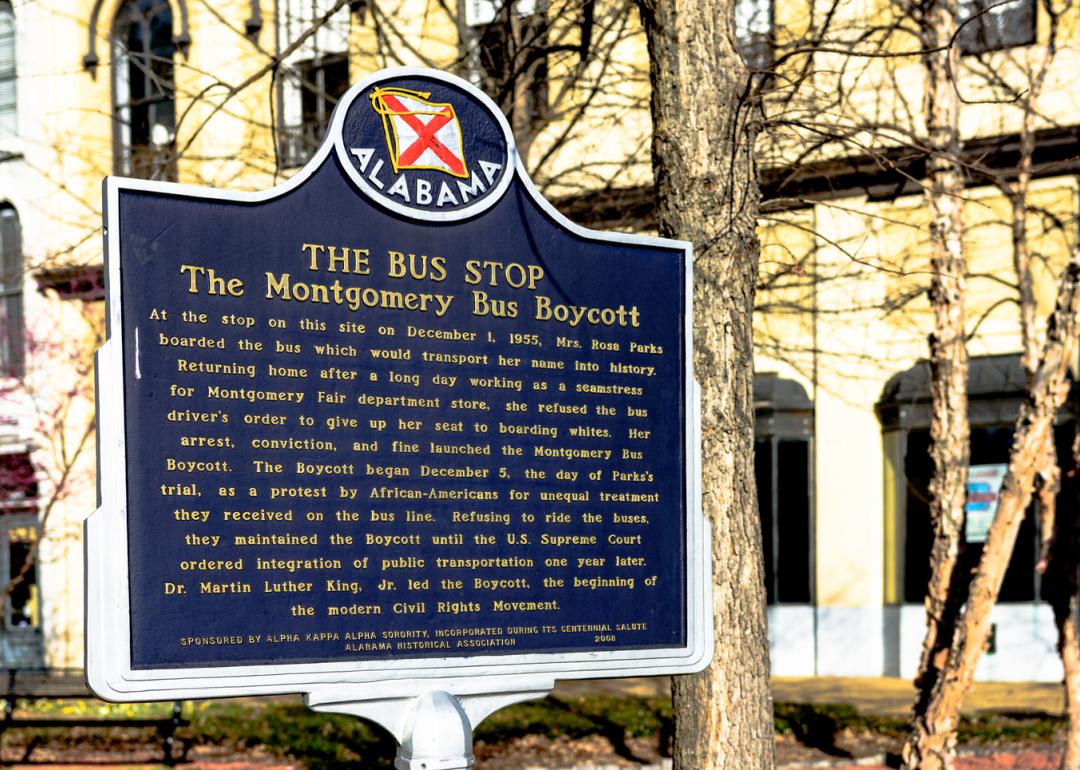
Explore historic sites commemorating Black history in Delaware
Explore historic sites commemorating Black history in Delaware
The legacies of influential Black Americans have not always been acknowledged, so it's not uncommon that modern-day residents may overlook the historic sites of their own cities.
While some historical Black figures in the U.S. are more well-known than others, there are in fact thousands of people dating back generations to 17th-century slavery who left traces of their visions and impacts all across the country. Whether prominent figures such as Robert Abbott, who founded one of the largest African American newspapers in the country, or more under-the-radar originators such as Obrey Wendell Hamlet, who cultivated unique vacation experiences in the Rocky Mountains, one thing's for certain: There is far more uncharted Black history in this country than charted.
Stacker identified historic sites commemorating Black history across 47 states, using the National Register of Historic Places. North Dakota, Vermont, Hawaii, and Wyoming did not have Black historic sites listed on the registry. While some states, especially in the South, are home to many sites central to the civil rights movement, Stacker listed the total sites in every state and the names of three historic sites where available. You can visit the full registry of 232 historic sites and explore the Civil Rights Trail to learn about additional locations across the U.S.
Read on to explore and learn about the historic sites celebrating Black history in your state, or read the national story here.
Delaware by the numbers
- Sites commemorating Black history: 18 (8 with state significance, 0 with national significance)
- Raymond Neck Historic District (Leipsic)
- Hickman Row (Claymont)
- Public School No. 111-C (Christiana)
Hickman Row buildings were completed in 1919 and were built to provide segregated housing for the company's Black American workforce. Many of the town's inhabitants were from the mass exodus of African Americans who left the South to escape social injustice and pursue better economic opportunities.
Continue reading to see which sites commemorate Black history in other states in your area.
Maryland
- Sites commemorating Black history: 44 (6 with state significance, 2 with national significance)
- Hampton National Historic Site (Towson)
- Sumner, Charles, Post #25, Grand Army of the Republic (Chestertown)
- African Methodist Episcopal Church (Cumberland)
The Sumner, Charles, Post #25, Grand Army of the Republic, built in 1908, was named after Charles Sumner, a senator who was against slavery and a huge advocate for voting rights for African Americans. For decades, the building served as a meeting hall for the Grand Army of the Republic, a veteran's association, and is one of two African American veteran halls in the U.S. that still exists to this day.
New Jersey
- Sites commemorating Black history: 33 (6 with state significance, 2 with national significance)
- T. Thomas Fortune House (Red Bank)
- Beverwyck Site (Parsippany-Troy Hills)
- Gethsemane Cemetery (Little Ferry)
Timothy Thomas Fortune was born a slave in Florida in 1856 and went on to become a successful journalist and publisher, civil rights leader, and influential economist in the Black community. Fortune and his family moved from Brooklyn to Red Bank, New Jersey, in the early 1900s. There, he built his home, which he nicknamed "Maple Hall." The T. Thomas Fortune House, which would become a structure of inspiration, is where Fortune and his wife would entertain notable Black leaders of the time such as Booker T. Washington. T. Thomas Fortune House currently holds public tours.



